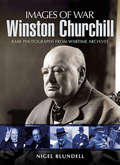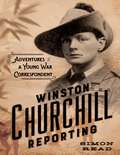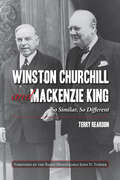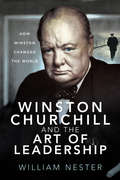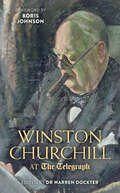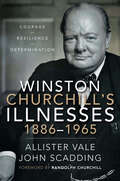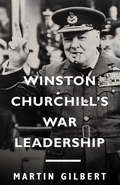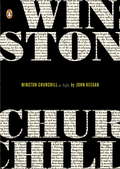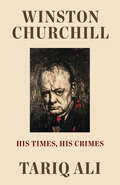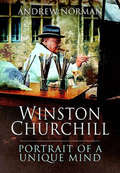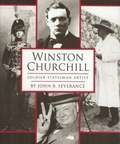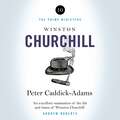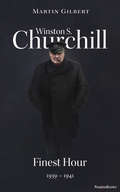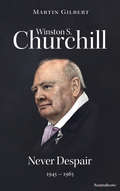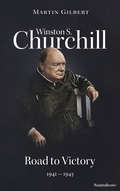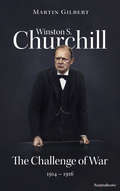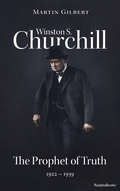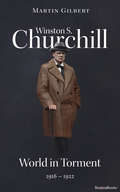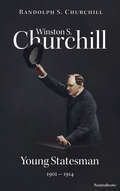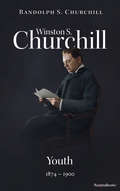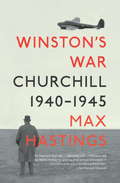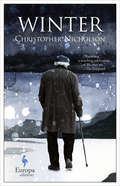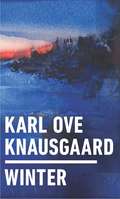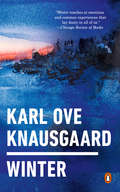- Table View
- List View
Winston Churchill
by Nigel BlundellWinston Churchill was an extraordinary person - a politician, a statesman, a man of letters and a soldier but it was for his wartime leadership during the Second World War that he is chiefly remembered. In a study of his life, certain bizarre character traits become discernible. He had excessive energy and required little sleep. His mind would either flit from one idea to another with bewildering speed or focus obsessively on one particular goal. He was impulsive, and his attention was easily drawn to irrelevant or unimportant matters. He enjoyed taking risks almost to the point of self-destruction. He lacked inhibition and was eccentric in the extreme. Yet at other times, when he was afflicted with what he called his 'Black Dog', he became depressed, irritable, aggressive, and preoccupied with death and thoughts of suicide. By closely and painstakingly examining the statements of Churchill's doctor, of Winston himself, his family, his friends and acquaintances, Dr. Norman, as a medical man, has been able to ascertain the true nature of Winston's disorder. The diagnosis having been made, it is now possible for the very first time, and this will remain secret until the book is published, to understand the man himself and what made him 'tick'.
Winston Churchill Reporting: Adventures of a Young War Correspondent
by Simon ReadCombat, cigars, and whiskey--from the jungles of Cuba and the mountains of the Northwest Frontier, to the banks of the Nile and the plains of South Africa, comes this action-packed tale of Winston Churchill's adventures as a war correspondent in the Age of Empire.
Winston Churchill and Mackenzie King: So Similar, So Different
by Terry Reardon The Right Honourable John N. TurnerThe story of the complex relationship between two world leaders during one of the greatest crises in human history. Born just two weeks apart in 1874, Winston Churchill and William Lyon Mackenzie King had much in common. Both forged long parliamentary careers, and each led his country to victory in World War II. A BBC poll deemed Winston Churchill the greatest Briton of all time, and Mackenzie King has been judged by a group of historians as the greatest Canadian prime minister. Their parallel careers fostered a working relationship that lasted almost fifty years. It was not always an easy relationship, however. Churchill, famous for his drink and cigars, was impetuous and charismatic, an extrovert; King, a teetotaller during WWII, was noted for considering all options before cautiously proceeding. Fate threw this ill-matched pair together. For the first time, the vital relationship between these two very different men is explored in depth. It is the story not just of two extraordinary leaders, but also of the changing bonds between Britain and Canada.
Winston Churchill and the Art of Leadership: How Winston Changed the World
by William NesterA unique biography that explores how Churchill viewed, pursued, and used power, by the award-winning author of Napoleon and the Art of Diplomacy.Many indeed, are the biographies of Winston Churchill, one of the most influential figures of the twentieth century. But what was that influence and how did he use it in the furtherance of his and his country’s ambitions? For the first time, Professor William Nestor has delved into the life and actions of Churchill to examine just how skillfully he manipulated events to place him in positions of power.His thirst for power stirred political controversy wherever he intruded. Those who had to deal directly with him either loved or hated him. His enemies condemned him for being an egoist, publicity hound, double-dealer, and Machiavellian, accusations that his friends and even he himself could not deny. He could only serve Britain as a statesman and a reformer because he was a wily politician who won sixteen of twenty-one elections that he contested between 1899 and 1955. The House of Commons was Churchill’s political temple, where he exalted in the speeches and harangues on the floor and the backroom horse-trading and camaraderie. Most of his life he was a Cassandra, warning against the threats of Communism, Nazism, and nuclear Armageddon. With his ability to think beyond mental boxes and connect far-flung dots, he clearly foretold events to which virtually everyone else was oblivious. Yet he was certainly not always right and was at times spectacularly wrong. This is the first book that explores how Churchill understood and asserted the art of power, mostly through hundreds of his own insights expressed through his speeches and writings.
Winston Churchill at the Telegraph
by Dr Warren Dockter And Boris JohnsonThis fascinating collection of reportage chronicles the Prime Minister’s life through the newspaper where he began his career.The Telegraph had a uniquely close connection with Winston Churchill at every stage of his life. Beginning with his early days as a war correspondent for the paper, the association continued as he himself became the news—reported on in its pages at every stage of his historic political career.Collected here, for the first time, is the best reportage on this complex man. Unencumbered by the legendary status he would later acquire, there is praise and blame in equal measure: finding space for both dramatic accounts of his wartime premiership and affectionate reports on the animals living at Chartwell, his country estate.The Telegraph was also a happy home for Churchill the journalist, and featured within are many pieces written in his unmistakable prose. Capturing the urgency of the time in which he lived, Churchill at the Telegraph is a celebration of an intimate relationship that lasted over sixty years and shows Winston Churchill in all his paradoxical glory.
Winston Churchill's Illnesses, 1886–1965
by Randolph Churchill Allister Vale John ScaddingThis in-depth account of the legendary leader’s ailments and their effects is a “tremendously important contribution to Churchillian studies” (Claremont Review of Books).Prominent physicians Allister Vale and John Scadding have written a meticulously researched and definitive account documenting all of Winston Churchill’s major illnesses, from an episode of childhood pneumonia in 1886 until his death in 1965. They have adopted a thorough approach in gaining access to numerous sources of medical information and have cited extensively from the clinical records of the distinguished physicians and surgeons invited to consult on Churchill during his many episodes of illness. These include not only objective clinical data, but also personal reflections by Churchill’s family, friends and political colleagues, resulting in a unique and fascinating study.
Winston Churchill's Illnesses, 1886–1965
by Randolph Churchill Allister Vale John ScaddingThis in-depth account of the legendary leader’s ailments and their effects is a “tremendously important contribution to Churchillian studies” (Claremont Review of Books).Prominent physicians Allister Vale and John Scadding have written a meticulously researched and definitive account documenting all of Winston Churchill’s major illnesses, from an episode of childhood pneumonia in 1886 until his death in 1965. They have adopted a thorough approach in gaining access to numerous sources of medical information and have cited extensively from the clinical records of the distinguished physicians and surgeons invited to consult on Churchill during his many episodes of illness. These include not only objective clinical data, but also personal reflections by Churchill’s family, friends and political colleagues, resulting in a unique and fascinating study.
Winston Churchill's War Leadership
by Martin GilbertHow does he assess the information that is brought to him? How does his personal or political philosophy, or a moral sense, sustain him? How does he draw inspiration from those around him? How does he deal with setbacks and disasters? In this brilliant close-up look at Winston Churchill's leadership during the Second World War, Gilbert gets to the heart of the trials and struggles that have confronted the world's most powerful leaders, even up to current politicians such as George Bush and Tony Blair.Basing the book on his intimate knowledge of Churchill's private and official papers, Sir Martin Gilbert, Churchill's official biographer, looks at the public figure and wartime propaganda, to reveal a very human, sensitive, and often tormented man, who nevertheless found the strength to lead his nation forward from the darkest and most dangerous of times.From the Trade Paperback edition.
Winston Churchill: A Life
by John KeeganOne of the greatest historians writing today gives us a defining portrait of the incomparable Winston Churchill In his landmark biography of Winston Churchill, acclaimed historian John Keegan offers a very human portrait of one of the twentieth century's enduring symbols of heroic defiance. From Churchill's youth as a poor student to his leadership during World War II, Keegan reveals a man whose own idea of an English past--eloquently embodied in his speeches--allowed him to exhort a nation to unprecedented levels of sacrifice. The result is a uniquely discerning look at one of the most fascinating personalities in history. "The best military historian of our generation. " -Tom Clancy .
Winston Churchill: His Times, His Crimes
by Tariq AliA critical and radical biography of the last great ImperialistThe subject of numerous biographies and history books, Winston Churchill has been repeatedly voted as one of the greatest of Englishmen. Even today, Boris Johnson in his failing attempts to be magisterial, has adopted many of his hero's mannerism! And, as Tariq Ali agrees, Churchill was undoubtedly right in 1940-41 to refuse to capitulate to fascism. However, he was also one of the staunchest defenders of empire and of Britain's imperial doctrine.In this coruscating biography, Tariq Ali challenges Churchill's vaulted record. Throughout his long career as journalist, adventurer, MP, military leader, statesman, and historian, nationalist self belief influenced Churchill's every step, with catastrophic effects. As a young man he rode into battle in South Africa, Sudan and India in order to maintain the Imperial order. As a minister during the first World War, he was responsible for a series of calamitous errors that cost thousands of lives. His attempt to crush the Irish nationalists left scars that have not yet healed. Despite his record as a defender of his homeland during the Second World War, he was willing to sacrifice more distant domains. Singapore fell due to his hubris. Over 3 Millions Bengalis starved in 1943 as a consequence of his policies. As a peace time leader, even as the Empire was starting to crumble, Churchill never questioned his imperial philosophy as he became one of the architects of the postwar world we live in today.
Winston Churchill: Portrait of an Unique Mind
by Andrew NormanSir Winston Leonard Spencer-Churchill is known chiefly for his leadership of the United Kingdom during World War Two. He served as Prime Minister from 1940 to 1945 and again from 1951 to 1955. A noted statesman and orator, Churchill was also an officer in the British Army, a historian, writer and artist. To date, he is the only British Prime Minister to have received the Nobel Prize in Literature, and the second person to be recognized as an Honorary Citizen of the United States. During his army career, Churchill saw military action in India, the Sudan and the Second Boer War. He gained fame and notoriety as a war correspondent and through contemporary books he wrote describing the campaigns. He also served briefly in the British Army on the Western Front in World War One, commanding the 6th Battalion of the Royal Scots Fusiliers. At the forefront of the political scene for almost fifty years, he held many political and cabinet positions. After losing the 1945 election, he became Leader of the Opposition. In 1951 he again became Prime Minister, before finally retiring in 1955. Upon his death, the Queen granted him the honor of a state funeral, which saw one of the largest assemblies of statesmen in the world.This unique images title contains many rare and unpublished photographs of Churchill throughout his military and political career.
Winston Churchill: Soldier, Statesman, Artist
by John B. SeveranceA vivid portrait of a unique leader who both experienced and influenced the great social and political changes of the first half of the twentieth century.
Winston Churchill: The Prime Ministers Series (The Prime Ministers)
by Peter Caddick-AdamsIn his short new biography of Winston Churchill, author Peter Caddick-Adams writes that the recipe for Winston Churchill's success during his wartime premiership of 1940-45 can be found in the First World War. He argues that Britain's survival under Churchill was precisely because the nation, and its leaders, had undergone a "dress rehearsal in 1914-18; conscription, rationing, convoys, air raids, mass production, womens' uniformed services, coalitions and war cabinets. It had all happened before." Churchill, who himself had served in war cabinets during the earlier world war, understood the art of the possible.
Winston S. Churchill: Finest Hour, 1939–1941 (Volume VI) (Winston S. Churchill Biography #6)
by Martin GilbertThe sixth volume in the official biography: &“A milestone, a monument, a magisterial achievement&” (Andrew Roberts, author of The Storm of War). Starting with the outbreak of war in September 1939 and ending with the Japanese attack on Pearl Harbor in December 1941, this volume in the epic biography of Winston S. Churchill draws on remarkably diverse material: from the War Cabinet and other government records to Churchill&’s own archive and diaries and letters of his private secretariat to the recollections of those who worked most closely with him. On the day Hitler invaded Poland, Churchill, aged sixty-four, had been out of office for ten years. Two days later, he became First Lord of the Admiralty, in charge of British naval policy and at the center of war direction. In May 1940 he became prime minister, leading his nation during a time of grave danger and setbacks. His first year and a half as prime minister included the Dunkirk evacuation, the fall of France, the Battle of Britain, the Blitz, the Battle of the Atlantic, the struggle in the Western Desert, and Hitler&’s invasion of Russia. By the end of 1940, Britain under Churchill&’s leadership had survived the onslaught and was making plans to continue the war against an enemy of unlimited ambition and ferocious will. One of Churchill&’s inner circle said: &“We who worked with Churchill every day of the war still saw at most a quarter of his daily tasks and worries.&” Martin Gilbert has pieced together the whole, setting in context much hitherto scattered and secret evidence, in order to give an intimate and fascinating account of the architect of Britain&’s &“finest hour.&” &“The most scholarly study of Churchill in war and peace ever written.&” —Herbert Mitgang, The New York Times
Winston S. Churchill: Never Despair, 1945–1965 (Winston S. Churchill Biography #8)
by Martin GilbertThe final volume of the acclaimed official biography: &“A meticulously detailed and annotated account of Churchill&’s declining years . . . A contemporary classic&” (Foreign Affairs). The eighth and final volume of Winston S. Churchill&’s official biography begins with the defeat of Germany in 1945 and chronicles the period up to his death nearly twenty years later. It sees him first at the pinnacle of his power, leader of a victorious Britain. In July 1945 at Potsdam, Churchill, Stalin, and Truman aimed to shape postwar Europe. But upon returning home, was thrown out of office in the general election. Though out of office, Churchill worked to restore the fortunes of Britain&’s Conservative Party while warning the world of Communist ambitions, urging the reconciliation of France and Germany, pioneering the concept of a united Europe, and seeking to maintain the close link between Britain and the United States. In October 1951, Churchill became prime minister for the second time. The Great Powers were navigating a precarious peace at the dawn of the nuclear age. With the election of Eisenhower and the death of Stalin, he worked for a new summit conference to improve East-West relations; but in April of 1955, ill health and pressure from colleagues forced him to resign. In retirement Churchill completed his acclaimed four-volume History of the English-Speaking Peoples and watched as world conflicts continued, still convinced they could be resolved by statesmanship. &“Never despair&” remained his watchword, and his faith, until the end. &“A milestone, a monument, a magisterial achievement . . . rightly regarded as the most comprehensive life ever written of any age.&” —Andrew Roberts, historian and author of The Storm of War &“The most scholarly study of Churchill in war and peace ever written.&” —Herbert Mitgang, The New York Times
Winston S. Churchill: Road to Victory, 1941–1945 (Winston S. Churchill Biography #7)
by Martin GilbertThe seventh volume of the acclaimed, official biography: &“An engrossing history of Churchill&’s crucial role in the grand alliance of World War II&” (Los Angeles Times). This seventh volume in the epic, multivolume biography of Winston S. Churchill takes up the story of &“Churchill&’s War&” with the Japanese attack on Pearl Harbor on December 7, 1941, and carries it on to the triumph of V-E Day, May 8, 1945, the end of the war in Europe. Acclaimed historian Martin Gilbert charts Churchill&’s course through the storms of Anglo-American and Anglo-Soviet rivalry, and between the conflicting ambitions of other forces embattled against the common enemy: between General de Gaulle, his compatriots in France, and the French Empire; between Tito and other Yugoslav leaders; between the Greek Communists and monarchists; between the Polish government exiled in London and the Soviet-controlled &“Lublin&” Poles. Amid all these volatile concerns, Churchill had to find the path of prudence, of British national interest, and, above all, of the earliest possible victory over Nazism. In doing so he was guided by the most secret sources of British Intelligence: the daily interception of the messages of the German High Command. These pages reveal, as never before, the links between this secret information and the resulting moves and successes achieved by the Allies. &“A milestone, a monument, a magisterial achievement . . . rightly regarded as the most comprehensive life ever written of any age.&” —Andrew Roberts, historian and author of The Storm of War &“The most scholarly study of Churchill in war and peace ever written.&” —Herbert Mitgang, The New York Times
Winston S. Churchill: The Challenge of War, 1914–1916 (Winston S. Churchill Biography #3)
by Martin GilbertVolume three of this authoritative Churchill biography chronicles his years of triumphant leadership in the Admiralty during World War I. Acclaimed British historian Sir Martin Gilbert continues the official biography of Sir Winston S. Churchill the eventful period between 1914 and 1916, with a full account of his achievements as first lord of the Admiralty during the Great War. These include Churchill&’s efforts to prolong the siege of Antwerp, his support for the use of air power, and his part in the early development of the tank. It shows the forcefulness with which he argued for an offensive naval policy, first against Germany, then against Turkey. Gilbert examines the political crisis of May 1915, during which the Conservative Party forced Asquith to form a coalition government. The Conservatives insisted that Churchill leave the center of war policymaking for a position of increasing political isolation. In the next seven months, while the Gallipoli campaign was being fought, Churchill served as chancellor of the Duchy of Lancaster, with no authority over military or naval policy. Resigning from the cabinet in November 1915, Churchill was appointed lieutenant-colonel, commanding an infantry battalion in the trenches of the Western Front. In May 1916, he returned from the trenches, hoping to reenter political life, but his repeated attempts to regain his once-substantial influence were unsuccessful. &“A milestone, a monument, a magisterial achievement . . . rightly regarded as the most comprehensive life ever written of any age.&” —Andrew Roberts, historian and author of The Storm of War &“The most scholarly study of Churchill in war and peace ever written.&” —Herbert Mitgang, The New York Times
Winston S. Churchill: The Prophet of Truth, 1922–1939 (Winston S. Churchill Biography #5)
by Martin GilbertThe &“important and engrossing&” fifth volume of the official Churchill biography chronicles his visionary leadership in the tense years approaching WWII (Foreign Affairs). This acclaimed biographical masterpiece opens with Winston S. Churchill&’s return to Conservatism and to the cabinet in 1924. The narrative unfolds into a vivid and intimate picture of his public life as well as his private world at Chartwell between the wars. With ample access to Churchill&’s private papers, Martin Gilbert strips away decades of accumulated myth and innuendo, showing the stateman&’s true position on India, his precise role (and private thoughts) during the abdication of Edward VIII, his attitude toward Mussolini, and his profound fears for the future of European democracy. Even before Hitler came to power in Germany, Churchill saw the dangers of a Nazi victory. And despite the unpopularity of his views in official circles, he persevered for six years in sounding the alarm against fascism. This book reveals for the first time the extent senior civil servants, and even serving officers of high rank, came to Churchill with secret information, having despaired at the magnitude of official lethargy and obstruction. Within the Air Ministry, the Foreign Office, and the Intelligence Services, individuals felt drawn to provide Churchill with full disclosures of Britain&’s defense weakness, keeping him informed of day-to-day developments from 1934 until the outbreak of war. People of all parties and in all walks of life recognized Churchill&’s unique qualities and demanded his inclusion in the government, believing he alone could give a divided nation guidance and inspiration. &“A milestone, a monument, a magisterial achievement . . . rightly regarded as the most comprehensive life ever written of any age.&” —Andrew Roberts, historian and author of The Storm of War &“The most scholarly study of Churchill in war and peace ever written.&” —Herbert Mitgang, The New York Times
Winston S. Churchill: World in Torment, 1916–1922 (Winston S. Churchill Biography #4)
by Martin GilbertThe fourth volume in the official biography—&“The most scholarly study of Churchill in war and peace ever written&” (Herbert Mitgang, The New York Times). Covering the years 1916 to 1922, Martin Gilbert&’s fascinating account carefully traces Churchill&’s wide-ranging activities and shows how, by his persuasive oratory, administrative skill, and masterful contributions to Cabinet discussions, Churchill regained, only a few years after the disaster of the Dardanelles, a leading position in British political life. Included are many dramatic and controversial episodes: the German breakthrough on the Western Front in March 1918, the anti-Bolshevik intervention in 1919, negotiating the Irish Treaty, consolidating the Jewish National Home in Palestine, and the Chanak crisis with Turkey. In all these, and many other events, Churchill&’s leading role is explained and illuminated in Martin Gilbert&’s precise, masterful style. In a moving final chapter, covering a period when Churchill was without a seat in Parliament for the first time since 1900, Martin Gilbert brilliantly draws together the many strands of a time in Churchill&’s life when his political triumphs were overshadowed by personal sorrows, by his increasingly somber reflections on the backward march of nations and society, and by his stark forecasts of dangers to come. &“A milestone, a monument, a magisterial achievement . . . Rightly regarded as the most comprehensive life ever written of any age.&” —Andrew Roberts, historian and author of The Storm of War
Winston S. Churchill: Young Statesman, 1901–1914 (Winston S. Churchill Biography #2)
by Randolph S. ChurchillThe second volume in this &“magisterial achievement&” of political biography chronicles Churchill&’s days in Parliament up to the outbreak of WWI (Andrew Roberts, historian and author of The Storm of War). Written by Winston S. Churchill&’s son, Randolph, the second volume of this authoritative, eight-volume biography begins as Churchill takes his seat in the House of Commons at the age of twenty-six. An independent spirit and rebel, his maiden speech received cheers from the Leader of the Opposition. In the years leading up to the Great War, Churchill was at the center of British political life. At the Home Office, he introduced substantial prison reforms and took a lead in curbing the powers of the House of Lords. At the Admiralty, beginning in 1911, he helped build the Royal Navy into a formidable fighting force. He learned to fly, and founded the Royal Naval Air Service. He was also active in attempts to resolve the Irish Question and to prevent civil war in Ireland. In 1914, as war in Europe loomed, Churchill wrote to his wife from the Admiralty: &“The preparations have a hideous fascination for me . . . yet I would do my best for peace, and nothing would induce me wrongfully to strike the blow. I cannot feel that we in this island are in any serious degree responsible for the wave of madness which has swept the mind of Christendom.&” When war came, the fleet was ready. It was one of Churchill&’s greatest early achievements. &“A milestone, a monument . . . rightly regarded as the most comprehensive life ever written of any age.&” —Andrew Roberts, historian and author of The Storm of War &“The most scholarly study of Churchill in war and peace ever written.&” —Herbert Mitgang, The New York Times
Winston S. Churchill: Youth, 1874–1900 (Winston S. Churchill Biography #1)
by Randolph S. ChurchillThe first volume of this authoritative biography chronicles the prime minister&’s youth from birth to early adulthood: &“An intimate, eloquent testimonial&” (Kirkus Reviews, starred review). Winston S. Churchill&’s son, Randolph, delivers a vivid, personal portrait of his father in this first part of an eight-volume biography that is widely considered the &“most scholarly study of Churchill in war and peace ever written&” (The New York Times). Told through a rich treasure trove of the Churchill&’s personal letters, this volume covers his life from early childhood to his return to England from an American lecture tour, on the day of Queen Victoria&’s funeral in 1900, in order to embark on his political career. In the opening pages, the account of his birth in 1874 is presented through letters of his family. The subject comes on the scene with his own words in a letter to his mother, written when he was seven. His later letters, as a child, as a schoolboy at Harrow, as a cadet at Sandhurst, and as a subaltern in India, show the development of his mind and character, his ambition and awakening interests, which were to merge into a unique genius destined for world leadership. An astounding narrative of a formidable man coming into his own and the times in which he lived, this portrait is a &“milestone, a monument, a magisterial achievement . . . rightly regarded as the most comprehensive life ever written of any age.&” (Andrew Roberts, historian and author of The Storm of War).
Winston’s War: Churchill, 1940–1945
by Max HastingsWith unparalleled insight, Hastings presents a vivid and incisive portrait of Winston Churchill, bringing to life the man and his complexities, from his courage in the face of certain defeat to his shortcomings and private anxieties.
Winter
by Christopher Nicholson“[This] beautifully restrained novel, a meditation on aging, marriage and loss, fictionalizes a well-known period in Thomas Hardy’s life” (The New York Times).A November morning in the 1920s finds an elderly man walking the grounds of his Dorchester home, pondering his past and future with deep despondence. That man is the revered novelist and poet Thomas Hardy, and this is a fictionalized account of his final years from the celebrated author of The Elephant Keeper.The novel focuses on true events surrounding the London theater dramatization of Hardy’s acclaimed novel Tess of the D’Urbervilles, including Hardy’s hand-picked casting of the young, alluring Gertrude Bugler to play Tess. As plans for the play solidify, Hardy’s interest in Gertie becomes a voyeuristic infatuation, causing him to write some of the best poems of his career. However, when Hardy’s reclusive, neglected wife, Florence, catches wind of Hardy’s desire for Gertie to take the London stage, a tangled web of jealousy and missed opportunity ensnares all three characters—with devastating results.Told from the perspectives of Hardy, Gertie, and Florence, Winter is “a meditation on love, regret, and an elusive yearning for happiness” (Kirkus Reviews, starred review).“A book for grown-ups, one that finds the acme of human happiness in a young mother looking out at a starry winter’s night, while she holds her baby in her arms.” —The Washington Post“Winter is quietly intelligent and compassionate, but what stands out most is that it is gorgeously, gorgeously written in prose so elegantly crafted that it becomes, paradoxically, almost invisible. It never shouts, never startles, just moves lithely along with an almost miraculous sense of rightness.” —Minneapolis Star-Tribune
Winter
by Karl Ove Knausgaard Lars LerinWinter, written to introduce his youngest daughter to the wonders of life, is one of the most profoundly moving and beautiful of Karl Ove Knausgaard's beloved works. While it stands alone for readers, it is also the exquisitely interwoven, second volume of the Seasons quartet--his new landmark literary project: written by a father to his unborn child.It is strange that you exist, but that you don't know anything about what the world looks like. It's strange that there is a first time to see the sky, a first time to see the sun, a first time to feel the air against one's skin. It's strange that there is a first time to see a face, a tree, a lamp, pajamas, a shoe. In my life that almost never happens anymore. But soon it will. In just a few months, I will see you for the first time.Winter is the continuation of Karl Ove Knausgaard's personal encyclopedia and record of the world that will soon make up the close reality of his yet unborn child. Comprising sixty short, surprising, and incredibly rich meditations on everything from the moon to fireworks to aquatic apes, Winter finds Karl Ove waxing philosophically and meaningfully on the big things that hide behind smaller things: the sublimity of bonfires, the strange mechanics of the inner ear, the evolution of our solar system, and the fearsome beauty of the Norse myths.Featuring gorgeous illustrations by award-winning watercolour artist Lars Lerin, with Winter, the Seasons quartet reaches new heights of meditative grandeur--an important and memorable gift for readers from one of the world's most important and beguiling literary artists.
Winter (Seasons Quartet Ser. #2)
by Karl Ove KnausgaardThe second volume in his autobiographical quartet based on the seasons, Winter is an achingly beautiful collection of daily meditations and letters addressed directly to Knaugsaard's unborn daughter 2 December - It is strange that you exist, but that you don't know anything about what the world looks like. It's strange that there is a first time to see the sky, a first time to see the sun, a first time to feel the air against one's skin. It's strange that there is a first time to see a face, a tree, a lamp, pajamas, a shoe. In my life it almost never happens anymore. But soon it will. In just a few months, I will see you for the first time. In Winter, we rejoin the great Karl Ove Knausgaard as he waits for the birth of his daughter. In preparation for her arrival, he takes stock of the world, seeing it as if for the first time. In his inimitably sensitive style, he writes about the moon, water, messiness, owls, birthdays--to name just a handful of his subjects. These oh-so-familiar objects and ideas he fills with new meaning, taking nothing for granted or as given. New life is on the horizon, but the earth is also in hibernation, waiting for the warmer weather to return, and so a contradictory melancholy inflects his gaze. Startling, compassionate, and exquisitely beautiful, Knausgaard's writing is like nothing else. Somehow, he shows the world as it really is, at once mundane and sublime.
